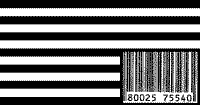
Are your groceries spying on you?
NEWSPAPER ENTERPRISE ASSN. June 8 2006
Has your electronics store (or drugstore or music store or department store) recently replaced its metal shelves with plastic ones? Such a move could signal a switch to a type of product tracking that has the potential to invade your privacy.
Radio Frequency Identification, or RFID, is a wireless technology that allows objects and even people to be tagged and tracked. RFID tags contain microchips and tiny radio antennas and are embedded in products or stuck on labels. (Tags slightly larger than a grain of rice can be implanted under the skin.)
Once activated, they transmit a unique identifying number to an electronic reader, which, in turn, links to a computer database where information about the product or person is stored.
Metal, as in shelves, can interfere with transmissions between tags and readers.
Although it sounds like science fiction, radio tagging is very much a reality. For years, railroads and the U.S. Department of Defense used radio tags to track inventory. Cars outfitted with radio tags that mark their passage have long breezed through tollbooths, while ExxonMobil's Speedpass — an RFID tag in the form of a key fob — enables drivers to pay for gas without swiping a card or using a PIN.
More recently, the technology has shown up in contactless payment cards such as Chase's Blink or MasterCard PayPass, on individual items at Wal-Mart and Best Buy, in library books and in U.S. passports. The use of RFID tags is growing so explosively that analysts forecast sales this year alone of 1.3 billion units — more than half as many tags as were sold in all years up through early 2006.
Part of the reason is that the price of the tags — topping $1 apiece in 1999 — is plummeting. Within five to seven years, radio tags are expected to cost less than a penny each — the magic point at which nearly anything we buy is likely to be tagged.
To be sure, radio-tagging products from CDs to shampoos can offer huge savings to businesses. (For one thing, it can alert stores to merchandise shortages, preventing out-of-stock losses and other supply-chain inefficiencies that cost retailers an estimated $40 billion annually.)
And the technology can directly benefit consumers by speeding them through checkouts, ensuring the genuineness of often-counterfeited prescription drugs, and — in the case of medical-information implants — providing data to doctors when patients cannot.
But there are touchy privacy issues, too. Identity thieves and other crooks can tap into the information transmitted from a radio tag to a scanner, culling — for example — banking or medical information. Researchers already have cracked the code in ExxonMobil's Speedpass, demonstrating for the company how a hacker could use mined data to charge gas on the Speedpass holder's account. (Despite this January 2005 demonstration, ExxonMobil has not changed the technology, claiming it knows of no fraudulent use of Speedpass from cloning.)
Other researchers have copied an implantable RFID tag, which could allow them to assume the implantee's identity and gain access to high-security locations. (VeriChip, the tag's manufacturer, says its product would serve as only one of several security layers thwarting such incursions.)
Because it has moved so rapidly to the forefront, there are those who would like to put the brakes on radio-tag technology. At least seven states have introduced RFID-related legislation, including a New Hampshire bill requiring that labels be placed on all items with tracking devices. Indeed, some products already are flagged as tagged, voluntarily displaying a thumbnail-sized Electronic Product Code (EPC) logo on their packages. Yet few consumers recognize the logo or understand its meaning.
So for now, at least, unless you are explicitly told by a merchant — or the product sits on a metal shelf — you're unlikely to know if the item you buy may be spying on you.


No comments:
Post a Comment